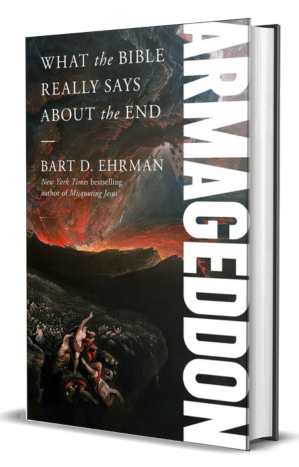
Armageddon what the Bible Really Says about the End
By Bart D. Ehrman
Publisher: Simon & Schuster (March 21, 2023)
Language: English
Hardcover: 272 pages
ISBN-10: 1982147997
ISBN-13: 978-1982147990
Affiliate Disclaimer: We may earn commissions on products you purchase through this page at no additional cost to you. Thank you for supporting our site!
DESCRIPTION
A “humane, thoughtful, and intelligent” (The New York Times Book Review) bestselling Biblical scholar reveals why our popular understanding of the Apocalypse is all wrong—and why that matters.
You’ll find nearly everything the Bible says about the end in the Book of Revelation: a mystifying prophecy filled with bizarre symbolism, violent imagery, mangled syntax, confounding contradictions, and very firm ideas about the horrors that await us all.
But no matter what you think Revelation reveals—whether you read it as a literal description of what will soon come to pass, interpret it as a metaphorical expression of hope for those suffering now, or only recognize its highlights from pop culture—you’re almost certainly wrong.
In Armageddon, acclaimed New Testament authority Bart D. Ehrman delves into the most misunderstood—and possibly most dangerous—book of the Bible on a “vigilantly persuasive” (The Washington Post) tour through three millennia of Judeo-Christian thinking about how our world will end. With wit and verve, he explores the alarming social and political consequences of expecting an imminent apocalypse, considers whether the message of Revelation may be at odds with the teachings of Jesus, and offers inspiring insight into how to live in the face of an uncertain future. By turns hilarious, moving, troubling, and provocative, Armageddon is nothing short of revelatory in its account of what the Bible really says about the end.
REVIEWS
“By inviting us to study Revelation in its context, and to read it for ourselves (the Tree of Life whose leaves are for the healing of nations, the water of life offered freely as a gift to all who thirst, as well as the plagues, the horsemen and the scorpions), he gives us the gift of considering anew John’s dream vision. The Bible can’t say any more than Queen’s “Greatest Hits Volume II” can say. But it does make an alarming and awful and sometimes healing sound.”
—The Washington Post
“Religion scholar Ehrman, professor of religious studies at the University of North Carolina, continues a career devoted to confronting conventional readings of the Bible by turning to its closing book. The author argues that Revelation has been improperly read and interpreted in modern times and that the book was written by a committed yet misled Christian who did not understand the true Christ.
Ehrman begins with a worthwhile overview of what Revelation is about and how it has been read and interpreted throughout the history of Christianity. He posits that Revelation was not a prophetic work aimed at explaining an event far in the future but had meaning and purpose directly aimed at the generation during which it was written. Ehrman hopes to look beyond the traditional end-times mentality to question its very view of Christ and his followers.
“The difficulty with Revelation,” he writes, “is not that it predicts a future that never happened but that it presents a view of God that is deeply unsettling….Is it not disturbing that, in the end, the unstoppable justice of God triumphs over his mercy?” The author then goes on to examine how the Christ of Revelation differs markedly from the Christ of the Gospels. He notes that God is portrayed in the Gospels as having mercy and love, whereas in Revelation, God is cruel, vengeful, and propelled by justice devoid of mercy.
“In my view,” he concludes, “the God of Revelation cannot be the true God.” All of this matters, Ehrman believes, precisely because Revelation has had far-reaching consequences on historical events. Christian sects have been built around it, popular views of how the world will end are based on it, and even foreign policy is influenced by it. Revelation is too significant to ignore and too important to be improperly read.
Well-argued, certain-to-be-controversial account of the Bible’s closing story.
—Kirkus
